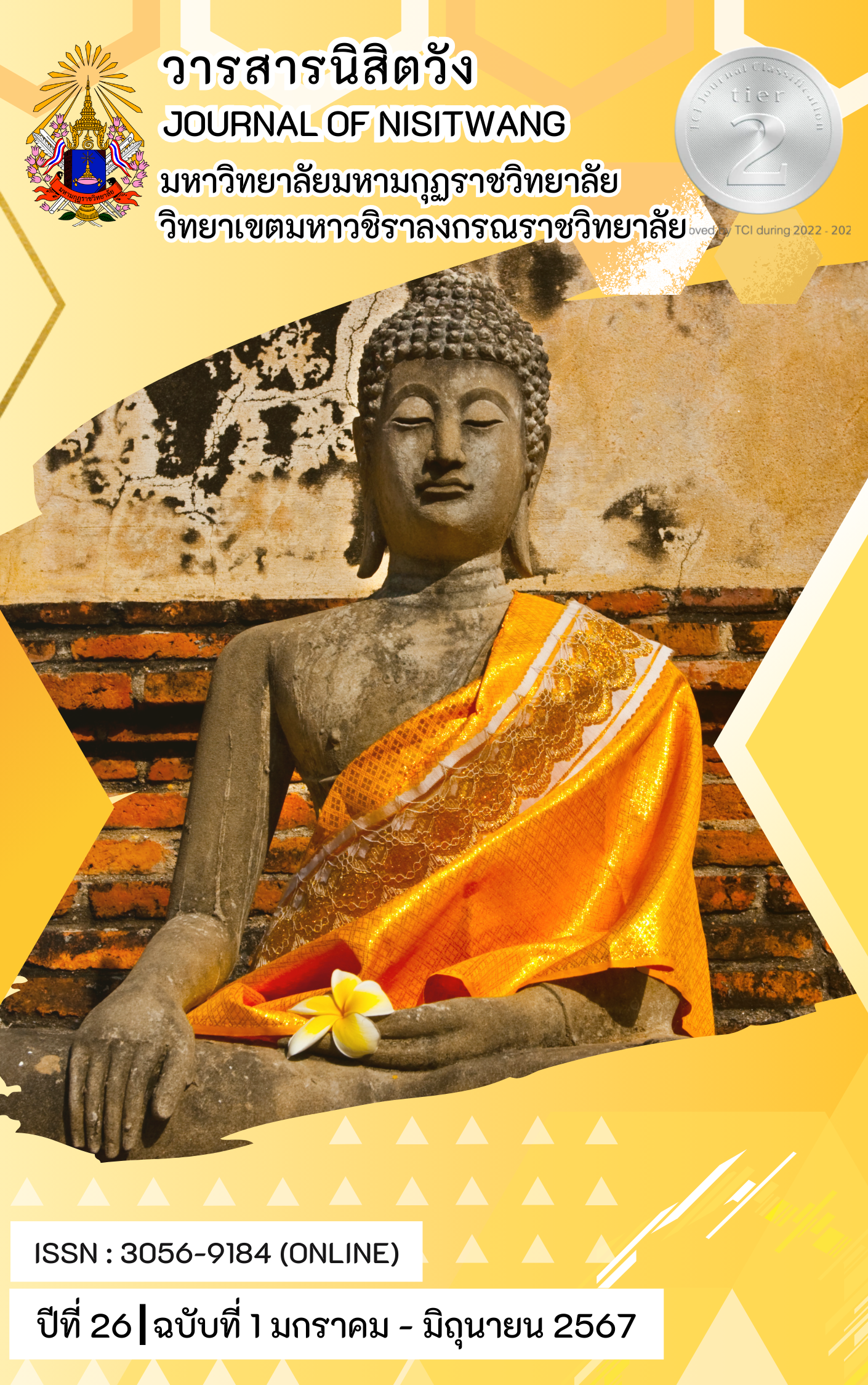PHENOMENON-BASED LEARNING MANAGEMENT ACCORDING BY READS MODEL HAS AN IMPACT ON THE EFFECTIVENESS OF LEARNING, SPECIFICALLY IN DEVELOPING HEALTH BEHAVIOR SKILLS FOR FIRST-YEAR PROFESSIONAL CERTIFICATE STUDENTS
Main Article Content
Abstract
The objective of this research were : (1) to compare the learning effectiveness before and after implementing Phenomenon-based learning using the READS model in the development of health behavior skills for first-year professional certificate students and (2) to study the satisfaction of students towards Phenomenon-based learning using the READS model in the development of health behavior skills for first-year professional certificate students. The research sample consists of 18 first-year professional certificate students (1/1) of Lopburi College of Dramatic Arts, Bunditpatanasilpa Institute, Ministry of Culture, in the second semester of the academic year 2566.
The participants were selected using Cluster Random Sampling by randomly selecting one classroom. The research tools include (1) the learning management plan for the development of health behavior skills in the first-year professional certificate program, (2) a performance effectiveness measurement test for health behavior skills in the first-year professional certificate program, with a reliability coefficient of 0.88, and (3) a satisfaction assessment questionnaire for students towards Phenomenon-based learning using the READS model in the development of health behavior skills in the first-year professional certificate program, with a reliability coefficient of 0.95. Statistical analyses utilized in data analysis include percentages, means, standard deviations, and dependent t-test.
The results were as follow :
(1) The learning effectiveness after implementing Phenomenon-based learning using the READS model in the development of health behavior skills for first-year professional certificate students is significantly higher than before the intervention at a significance level of .05.
(2) The overall satisfaction of students towards Phenomenon-based learning using the READS model in the development of health behavior skills for first-year professional certificate students is at the highest level (x̅ = 4.73, S.D. = 0.34)
Article Details
References
กระทรวงศึกษาธิการ. (2551). หลักสูตรแกนกลางการศึกษาขั้นพื้นฐาน พุทธศักราช 2551.
กรุงเทพฯ : โรงพิมพ์ชุมนุมสหกรณ์การเกษตรแห่งประเทศไทย.
ขัณธ์ชัย อธิเกียรติ และธนารักษ์ สารเถื่อนแก้ว. (2559). การสอนแบบทันสมัยและเทคนิควิธีสอนแนวใหม่.
[Online]. Available : http://regis.skru.ac.th/RegisWeb/datafiledownload/25590714-15.pdf. [2567, กุมภาพันธ์ 7].
ทิศนา แขมมณี. (2554). ศาสตร์การสอน องค์ความรู้เพื่อการจัดกระบวนการเรียนรู้ที่มีประสิทธิภาพ. พิมพ์ครั้งที่ 15. กรุงเทพฯ : สำนักพิมพ์แห่งจุฬาลงกรณ์มหาวิทยาลัย.
บุญชม ศรีสะอาด. (2556). การวิจัยเบื้องต้น. พิมพ์ครั้งที่ 9. กรุงเทพฯ : สุวีริยาสาส์น .
พงศธร มหาวิจิตร. (2562). การประยุกต์ใช้แนวคิดการเรียนรู้โดยใช้ปรากฏการณ์เป็นฐานร่วมกับการเรียนแบบ
เชิงรุก ในรายวิชาการประถมศึกษา เพื่อเสริมสร้างทักษะการเรียนรู้ในศตวรรษที่ 21. วารสารศึกษาศาสตร์ มหาวิทยาลัยขอนแก่น, 42 (2), 73-90.
พิมพันธ์ เดชะคุปต์ และพเยาว์ ยินดีสุข. (2558). การจัดการเรียนรู้ในศตวรรษที่ 21. พิมพ์ครั้งที่ 2. กรุงเทพฯ : โรงพิมพ์แห่งจุฬาลงกรณ์มหาวิทยาลัย.
รวินันท์ สัจจาศิลป์ และชลาธิป สมาหิโต. (2562). ผลการจัดประสบการณ์การเรียนรู้โดยใช้ปรากฏการณ์เป็นฐาน
ผ่านการสร้างสื่อจําลองที่มีต่อความสามารถด้านมิติสัมพันธ์สำหรับเด็กปฐมวัย. วารสารวิชาการและวิจัยสังคมศาสตร์, 16 (2), 111-124.
วารินท์พร ฟันเฟื่องฟู. (2566). ผลการจัดการเรียนรู้โดยใช้ปรากฏการณ์เป็นฐานตามรูปแบบ READS วิชา
การพัฒนาหลักสูตร ระดับปริญญาตรีชั้นปีที่ 2. วารสารนิสิตวัง, 25 (2), 33-45.
อลงกรณ์ พรมที. (2556). การพัฒนารูปแบบการเรียนการสอนตามทฤษฎีการเรียนรู้กลุ่มพุทธินิยม เรื่องคลื่น
แม่เหล็กไฟฟ้าและการแพร่กระจายสำหรับการศึกษาระดับปริญญาตรี สาขาวิศวกรรมไฟฟ้า. วิทยานิพนธ์ปรัชญาดุษฎีบัณฑิต มหาวิทยาลัยเทคโนโลยีพระจอมเกล้าพระนครเหนือ.
Somkiart Intasingh. (2019). Development of Learning Management Model by Integrating
PhenoBL Approach and DTP to Promote Curriculum Knowledge, Innovative Thinking
Ability, and Achievement Motivation of Thai Pre-Service Teachers. ASEAN Journal of
Education, 5 (2), 21-32.
Symeonidis, V., and Schwarz, J. F. (2016). Phenomenon-Based Teaching and Learning through the
Pedagogical Lenses of Phenomenology: The Recent Curriculum Reform in Finland. Forum
Oświatowe, 28 (2), 31-47.
Varinporn Funfuengfu. (2022). The development of Phenomenon-Based Learning Model for enhancing Active learning Competencies of Teacher Students. International Journal of Positive School Psychology, 6 (7), 1366–1377.


